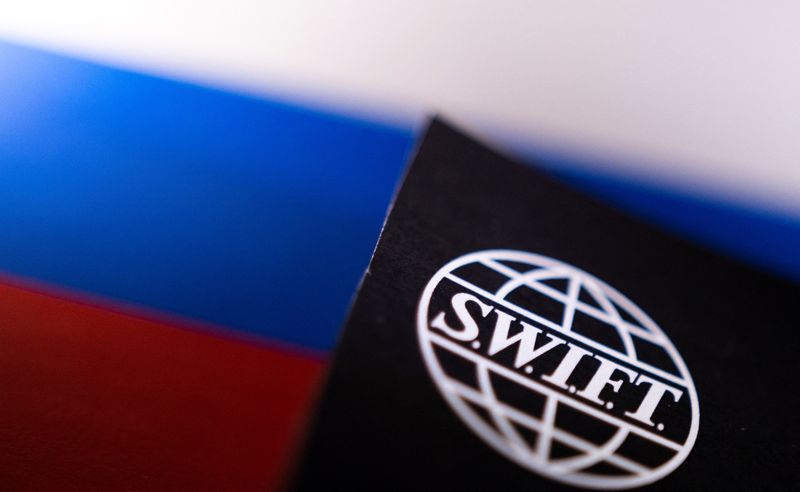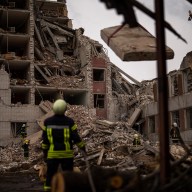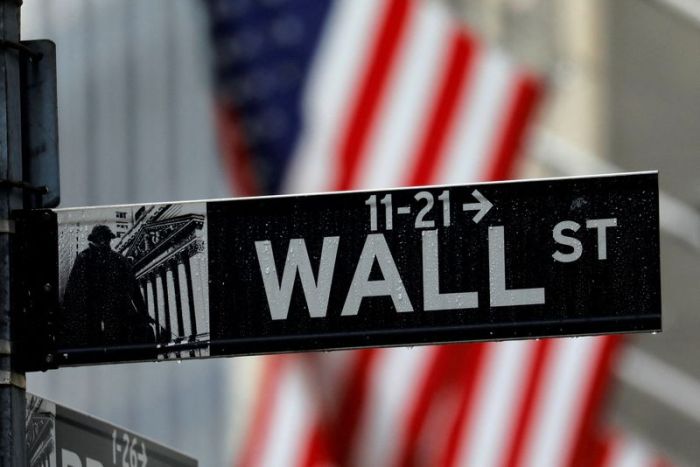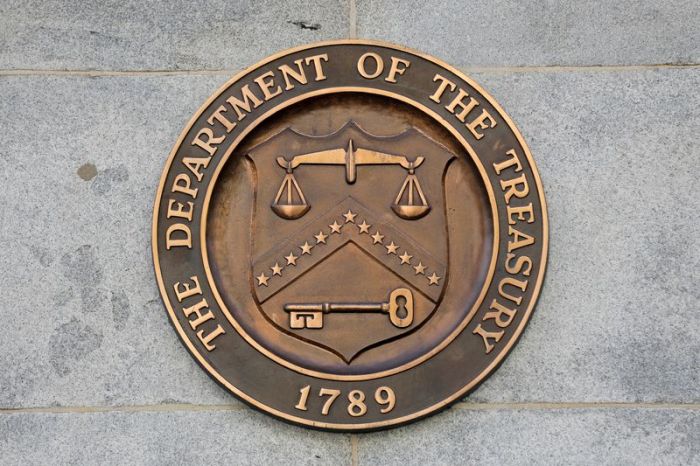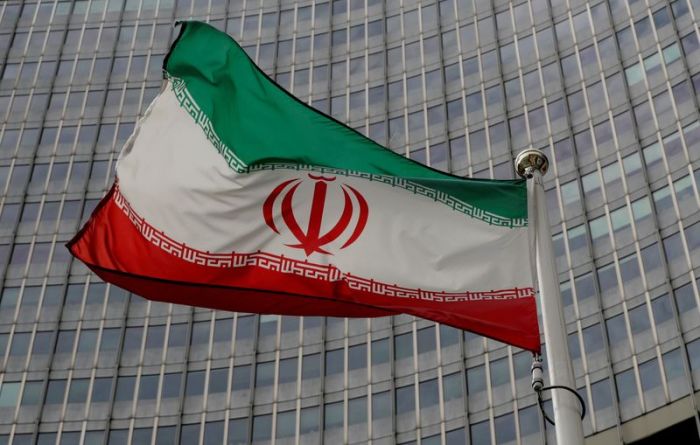NEW YORK (Reuters) – The United States, Britain, Europe and Canada on Saturday moved to block Russia’s access to the SWIFT international payment system as part of another round of sanctions against Moscow as it continues its assault against Ukraine.
The United States and its European partners also said they would impose restrictions on Russian’s central bank to limit its ability to support the rouble.
Here is a primer about what SWIFT does and why it matters:
Here are some comments from market analysts and banks:
MOHAMED EL-ERIAN, PART-TIME CHIEF ECONOMIC ADVISOR, ALLIANZ, CHAIR OF GRAMERCY FUND MANAGEMENT:
“If applied comprehensively rather than piecemeal, excluding Russia from SWIFT has the potential to cripple the economy there. Inevitably there would be spillovers and spillbacks, including more of a stagflationary impetus to the global economy and greater likelihood of Russian arrears to western companies and creditors.”
MICHAEL ROSEN, CHIEF INVESTMENT OFFICER, ANGELES INVESTMENT ADVISORS, SANTA MONICA, CA:
“Europeans saw this move, expelling Russia from SWIFT, as a “nuclear option,” that is, the most severe, last resort, action that could be taken. If so, it will have as much impact as throwing a spear against a tank.
“If Europe will not pay Russia for its oil and gas, either that supply will be cut off or Russia will simply run up a bill to settled later. Russia has a sizable stash of currency reserves and will still be able to earn revenue by bypassing SWIFT, via China or other parties.
“Europe (allowed) itself to become dependent on Russian energy. This move comes too little, too late in every respect. Biden’s sanctions last week cut off Russia from corresponding banks in the US, a big deal, but made an exception for energy payments. To have maximum impact on Russia, we will have to block them from SWIFT without exception for energy payments, and consider applying secondary sanctions to third parties who bypass SWIFT to transact with Russia.”
TOM MARTIN, SENIOR PORTFOLIO MANAGER, GLOBALT INVESTMENTS, ATLANTA:
“SWIFT is going to be painful and the markets are going to recognize that. What you are going to get is continued volatility as all the participants are going to be adjusting their risk tolerance to what they think the situation is about. I imagine people will be going to gold, because gold is the traditional hedge in this situation. I think U.S. Treasuries of any duration will probably be a safe haven. And other than that there’s nothing that isn’t going to be volatile.”
KARL SCHAMOTTA, CHIEF MARKET STRATEGIST, CORPAY, TORONTO
“We should see the ruble plunge, most likely through the 86 mark at the open. With newly announced sanctions likely to cripple the Russian economy and diminish the attractiveness of anything that can be traced back to Moscow, investors will abandon ship en masse. And with the central bank likely to face severe constraints on currency intervention, the ruble will struggle to find a bottom. No one wants to catch a falling knife.”
HARRY BROADMAN, CHAIR OF EMERGING MARKETS PRACTICE, BERKELEY RESEARCH GROUP, WASHINGTON, D.C.
“Sanctions have lots of foibles as we know from history. The more comprehensive they can be, the more they cover, the more you raise the probability of effectiveness. But in this case it is hard to understand what drives Putin’s decision-making process. The more sanctions we get and the broader the coalition of people putting them in place, the probability of success goes higher. But there’s no formula.”
FORMER RUSSIAN DEPUTY CENTRAL BANK CHAIRMAN SERGEY ALEKSASHENKO, WASHINGTON DC:
“It means there is going to be a catastrophe on the Russian currency market on Monday. I think they will stop trading and then the exchange rate will be fixed at an artificial level just like in Soviet times.”
“It’s much worse than [the Russian financial crisis of] of 1991 because it’s not clear on what conditions all this can be canceled. This is a very strong decision, the strongest one that could be taken and I consider it is absolutely correct.”
ROSS DELSTON, U.S. LAWYER AND FORMER BANKING REGULATOR, ST LOUIS, MO:
“It’s the closest thing to a declaration of war from a financial perspective. If there was an actual hot war between the US and Russia, these are the kind of sanctions that one would expect to occur.
“It’s going to result in Russia being viewed as radioactive by US and EU banks, which in turn would be a major barrier to trade with Russia.”
JORDAN KAHN, PRESIDENT AND CHIEF INVESTMENT OFFICER, ACM FUNDS, LOS ANGELES:
“If we’re talking effects on the market, my guess is that it’s going to be viewed as a net negative … global banks are all interconnected at some point and so if this causes a run on Russian banks, or anything like that, I think that that’s a negative perception, combined with the fact that the U.S. is tightening the screws on Russia by enacting SWIFT.
“We already saw late last week some cyber attacks… I think that there could be some concern amongst investors about further retaliation on the part of Russia: are they going to try to intensify things out there?
“And so I think the concern is going to be does this kind of escalate the back and forth retaliation? … It might be a longer term positive because it’s an attempt to try to pressure Putin towards resolution. But in the short term, it seems like it’s kind of a net negative.”
“There’s perception and sentiment, and then there’s the reality and the fundamentals. I don’t think at the end of the day, when banks report their earnings, especially for the year as a whole, I don’t think that there’s going to be any mention or charges that they have to take as a result of this, but in the short term, sentiment-wise and just fear-wise, I think that the U.S. banks could get caught up in some concern about: does this have any ripple effects throughout the global banking system?”
CLAY LOWERY, EXECUTIVE VICE PRESIDENT, INSTITUTE OF INTERNATIONAL FINANCE:
“These new sanctions, which include removing several Russian banks from SWIFT and sanctioning Russia’s central bank, are likely to cause serious damage to the Russian economy and its banking system. This will most likely exacerbate ongoing bank runs and dollarization, causing a sharp sell-off, and a drain on reserves.
“One of the biggest impacts on the global economy is likely to be on trade. While details on how the new sanctions affect energy are still emerging, we do know that sanctions on its central bank will make it more difficult for Russia to export energy and other commodities. As a result, we may see commodity prices surge.”
DENNIS DICK, HEAD OF MARKETS STRUCTURE AND PROPRIETARY TRADER AT BRIGHT TRADING LLC, LAS VEGAS:
“I think the whole world is trying to figure out a way to obviously rectify or at least stop what’s happening over in Ukraine without physical intervention.
“Any type of action they can do that obviously avoids… us … sending troops over, is going to probably be seen as a positive by Wall Street.”
“Is the worst behind us for Wall Street? I kind of tend to think it might be.”
“I think, whatever the U.S. can do to limit Putin’s finances is going to be viewed as a positive by Wall Street.”
SONIA KOWAL, PRESIDENT, ZEVIN ASSET MANAGEMENT, BOSTON
“You need a functioning banking system to have a functioning economy. This goes some way toward undermining the Russian economy.”
EDWARD MOYA, SENIOR MARKET ANALYST, OANDA, NEW YORK:
“This will draw comparisons to what happened to Iran, and the crippling effect to their economy, and this is more likely to deliver a major shock to global financial markets when we open up on Sunday night.”
“I think a lot of traders were kind of becoming convinced that the US and Europe were not taking a hard stance and that they were really focused on protecting the economic situation at hand and not really posing a major blow to the financial system. This action will be really difficult to digest and it will really pick a nerve for a lot of investors … a lot of the rebound we saw in the latter half of last week will be tested.”
MICHAEL FARR, CEO AND FOUNDER OF FARR, MILLER & WASHINGTON LLC:
“Markets are looking for surprises, and this could be a surprise that is not taken very well if it means a slowdown in international trade.
“This move to remove Russia from SWIFT means that they are actually putting their money where their mouths are. This curtails Russia’s ability to execute transactions around the world, and cuts their financial flows off from most countries, so it is a severe step that should get their full attention.
“The issue will be the inflation that gets caused here, and the extent to which it can really slow the European economy. It could create headwinds if it goes on and on and on.”
PAUL MARQARDT, LAWYER WITH DAVIS POLK, WASHINGTON DC:
“Getting kicked out of SWIFT doesn’t make transactions impossible, it makes them much more difficult – getting kicked out of SWIFT would increase transaction costs significantly.”
PHIL ORLANDO, CHIEF EQUITY MARKET STRATEGIST, FEDERATED HERMES, NEW YORK:
“We’ve been calling for US to ban Russia from SWIFT and sanction purchase of Russian oil and gas. We can tighten the screws further. [Investors must] expect [Russia], if backed into an economic corner, [to] resort to some form of cybersecurity against those who acted.” That would increase market volatility, he said.
(Reporting by Davide Barbuscia, David Randall, Ross Kerber, Saqib Iqbal Ahmed, Ira Iosebashvili, Michelle Price and Matt Scuffham in New York, Boston and Washington; Catherine Belton in London; compiled by Megan Davies)

